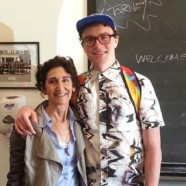
By Martha Rose Shulman
When I graduated from Milton Academy in 1968, I did not look back. I kept in touch with close friends and a few of my teachers, and I visited the school once, but I never went to a class reunion and I never donated. Nor did my sister (Class of 1967). I always appreciated the amazing education I got at Milton, especially because I didn’t go on to lead a conventional life, and I’ve always believed that my Milton education gave me the intellectual confidence to do that. But I do not have fond memories of my time there.
So I am more surprised than anyone that I am now a Milton parent and thrilled to be one. This is not because I have changed; it’s because the School has changed. The Milton Academy that my son goes to is not the Milton Academy that I went to in the ’60s.
That School was not kind, and it certainly was not fun. Nor was it diverse, by any stretch. It was an enclave of WASPs; it made me more aware that I was Jewish than I had ever been in my life. When I first arrived at Milton I was a fish out of water. That first week I shook during classes, my hands sweat, and I had a lump in my throat. I know this still happens to students who suddenly find themselves out of the little pond where they had always been the smartest, but at the time this feeling had more to do with the fact that Milton was not nurturing in any way. It was sink or swim.
Driven survivor that I am, I swam, willing my teachers to love me, becoming an enthusiastic hockey goalie, and work-ing so hard that the headmistress, Miss Johnson, expressed concern to my parents. Making friends was easy, but I never developed any passion for the place. Few of us did.
Decades later I was surprised to hear from two of my closest, coolest friends in L.A. that their daughter, Tess, had decided to go to boarding school and had chosen Milton. She had a wonderful time, and when they told me what the place was like, I could tell that things had changed since my Milton days.
Private school for my own son had never been on my mind. It was not a financial possibility for me, and Liam was getting a good enough education in the magnet public schools he attended in Los Angeles. But by eighth grade he was bored, and one day he told me he wanted to go to boarding school.
I told him to research several East Coast and California schools online. “If you get in, and if you get financial aid, then I’m all for it.” Both of those things happened.
In April 2013, Liam and I went to Milton’s revisit day. My sister came, too. It was the first time we had set foot on campus since 1968. We were flabbergasted by the different world we walked into that day. We were not surprised by the excellent education. The beautiful, new facilities were also not unexpected, nor that the place was now thoroughly co-ed. But everything else was different. Life at Milton seemed balanced. The administration and teachers seemed to really care about the total well-being of the students, and the students looked happy! The faculty and administration looked happy too, and both the faculty and student body were diverse.
What changed? We cornered Mr. Ball after a presentation and asked him. He seemed to know exactly what we were referring to, and said that the changes had begun to take hold in the 1990s. “We knew that we had to change if we were going to survive as a school,” he told us. And so they did.
The gamble Milton Academy took on Liam is paying off both for Liam and for Milton. Which is why now, to my great surprise, I find myself to be one of Milton’s biggest boosters. One way I can give back is to reach out to my contemporaries, who, like me, may not have the best memories of Milton. Look again; go and visit; check out the website. You will smile and shake your heads in disbelief. I hope you’ll be inspired to give, so that more students can have the life-changing opportunity that was so generously given to my son.
Martha Rose Shulman ’68 is a cookbook author and writes Recipes for Health for the New York Times



